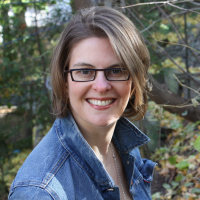A new documentary about Israel/Palestine tells a familiar though compelling tale. The Village Under the Forest relates the journey of a woman who discovers portions of her ethno-national narrative that have been obscured from her in her community’s zeal to appear righteous. Director and producer Mark J. Kaplan’s film focuses on Heidi Grunebaum, a South African Jewish scholar and author who discovers the fate of the Palestinian village of Lubya. Located near Tiberias, Lubya was evacuated during the 1948 war, its residents expelled and the structures reduced to bits of rubble. The remains are still visible, if you’re looking, within a Jewish National Fund (JNF)-planted park called The South Africa Forest funded by coins collected in famed JNF blue boxes by South Africa’s Jewish community, including Grunebaum herself.
Told through interviews with the village’s surviving residents as well as two critical historians (Avi Shlaim and Ilan Pappe) and an Israeli social activist (Eitan Bronstein of the Israeli NGO Zochrot), the film lands on the moral and political conclusion that the Palestinian refugees must be allowed to return to Israel.
Aside from the heavy-handed score (featuring music by outspoken anti-Zionist activist Gilad Atzmon) and sometimes melodramatic writing and narration by Grunebaum herself, the film moves along in a captivating way. Viewers of the film will, no doubt, have varied reactions, reactions that tend to parallel one’s view of the Israel/Palestine morass.Specifically, what will wildly differ in the hearts and minds of viewers of this film are at least four sets of questions: First, was Israel born in sin? Or were the actions of the Haganah and IDF in 1947-48 necessary and therefore just? Second, were the JNF Jewish-only land-leasing policies just in their origins? And is there still a need for these Jewish-only land policies, or should the JNF be dismantled? Third, what is the best solution to the Palestinian refugee issue, given the needs and identities of each side? And finally, is Israel an apartheid state, and if so, does the entire Jewish State apparatus—in all its institutional forms—need to be deconstructed and rebuilt, as South Africa was?
Is the film “balanced”—in the sense of it providing multiple perspectives on these questions? No. But must a film that wades into an ongoing conflict—where significant communities, individuals and governments view the practical and moral outcomes differently—present a “balanced” view? No doubt the filmmakers and much of the Palestine solidarity community would say that given the suffering of Palestinian refugees and their descendants, the morality tale is clear. There is no more need for a morally “balanced” view on this “conflict” as there is a need for a morally balanced view on any number of other instances of atrocity, massacre, expulsion, forced relocation, and so on, that have stained human history. In fact, it is for these reasons that many Palestine supporters abhor the term “conflict” or “dispute” to describe that region’s turmoil.
But Zionists and their supporters see the morality tale quite differently, which is what makes the Apartheid analogy—and the related suggestion that Israel is a fundamentally immoral political project—so difficult to swallow.
The mirror-image narratives of the 1948 war—to Israelis, a war of liberation; to Palestinians, the catastrophe of the Nakba—are now well known, as are the “Judaizing” land policies of the JNF. Many Diaspora Jews, including myself, have been struck at various points in our lives by the moral tension of layers of memory and forgetting present across the landscape of Israel. My grandparents purchased JNF trees in my honor when I was young. I have visited the forest on a family pilgrimage when JNF tree-planting seemed less morally fraught with politics. I have since reflected on these issues, as the narrator and filmmakers have. But what is less obvious to me than to Grunebaum is the appropriate solution by which to move forward.
Another question remains: Must those who attempt to solve the Israel/Palestine conflict agree on the rightness and wrongness of the past and present before arriving at a solution? Or might a solution be found that is mutually satisfactory to both sides—even if each side must forgo their maximum desires? Perhaps at that point, questions of morality may be allowed to gently seep into the cracks of memory, allowing moments of true reconciliation to surface.




